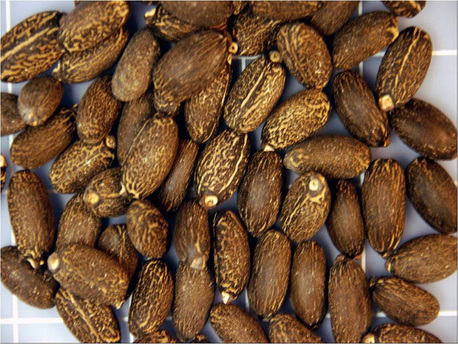Space Farm
Alternative Energy Crops in Space
What if space held the key to producing alternative energy crops on Earth? That's what researchers are hoping to find in a new experiment on the International Space Station. The experiment, National Lab Pathfinder-Cells 3, is aimed at learning whether microgravity can help jatropha curcas plant cells grow faster to produce biofuel, or renewable fuel derived from biological matter.
 |
Seeds of J. curcas. Seeds are pressed for oil extraction, which can be utilized as biofuel. (c) Dr. Wagner A Vendrame, University of Florida at Homestead
Jatropha is known to produce high quality oil that can be converted into an alternative energy fuel, or biofuel.
By studying the effects of microgravity on jatropha cells, researchers hope to accelerate the cultivation of the plant for commercial use by improving characteristics such as cell structure, growth and development. This is the first study to assess the effects of microgravity on cells of a biofuel plant.
"As the search for alternate energy sources has become a top priority, the results from this study could add value for commercialization of a new product,” said Wagner Vendrame, principal investigator for the experiment at the University of Florida in Homestead. "Our goal is to verify if microgravity will induce any significant changes in the cells that could affect plant growth and development back on Earth."
Launched on space shuttle Endeavour’s STS-130 mission in February, cell cultures of jatropha were sent to the space station in special flasks containing nutrients and vitamins. The cells will be exposed to microgravity until they return to Earth aboard space shuttle Discovery's STS-131 mission targeted for April.
For comparison studies of how fast the cultures grow, a replicated set of samples are being maintained at the University of Florida's Tropical Research and Education Center in Homestead.
"Watching the space shuttle go up carrying a little piece of my work is an indescribable experience," said Vendrame. "Knowing that my experiment could contribute to creating a sustainable means for biofuel production on Earth, and therefore making this a better world adds special value to the work."
Source: NASA
By studying the effects of microgravity on jatropha cells, researchers hope to accelerate the cultivation of the plant for commercial use by improving characteristics such as cell structure, growth and development. This is the first study to assess the effects of microgravity on cells of a biofuel plant.
"As the search for alternate energy sources has become a top priority, the results from this study could add value for commercialization of a new product,” said Wagner Vendrame, principal investigator for the experiment at the University of Florida in Homestead. "Our goal is to verify if microgravity will induce any significant changes in the cells that could affect plant growth and development back on Earth."
Launched on space shuttle Endeavour’s STS-130 mission in February, cell cultures of jatropha were sent to the space station in special flasks containing nutrients and vitamins. The cells will be exposed to microgravity until they return to Earth aboard space shuttle Discovery's STS-131 mission targeted for April.
For comparison studies of how fast the cultures grow, a replicated set of samples are being maintained at the University of Florida's Tropical Research and Education Center in Homestead.
"Watching the space shuttle go up carrying a little piece of my work is an indescribable experience," said Vendrame. "Knowing that my experiment could contribute to creating a sustainable means for biofuel production on Earth, and therefore making this a better world adds special value to the work."
Source: NASA
Space Farm
Alternative Energy Crops in Space
What if space held the key to producing alternative energy crops on Earth? That's what researchers are hoping to find in a new experiment on the International Space Station. The experiment, National Lab Pathfinder-Cells 3, is aimed at learning whether microgravity can help jatropha curcas plant cells grow faster to produce biofuel, or renewable fuel derived from biological matter.
 |
Seeds of J. curcas. Seeds are pressed for oil extraction, which can be utilized as biofuel. (c) Dr. Wagner A Vendrame, University of Florida at Homestead
Jatropha is known to produce high quality oil that can be converted into an alternative energy fuel, or biofuel.
By studying the effects of microgravity on jatropha cells, researchers hope to accelerate the cultivation of the plant for commercial use by improving characteristics such as cell structure, growth and development. This is the first study to assess the effects of microgravity on cells of a biofuel plant.
"As the search for alternate energy sources has become a top priority, the results from this study could add value for commercialization of a new product,” said Wagner Vendrame, principal investigator for the experiment at the University of Florida in Homestead. "Our goal is to verify if microgravity will induce any significant changes in the cells that could affect plant growth and development back on Earth."
Launched on space shuttle Endeavour’s STS-130 mission in February, cell cultures of jatropha were sent to the space station in special flasks containing nutrients and vitamins. The cells will be exposed to microgravity until they return to Earth aboard space shuttle Discovery's STS-131 mission targeted for April.
For comparison studies of how fast the cultures grow, a replicated set of samples are being maintained at the University of Florida's Tropical Research and Education Center in Homestead.
"Watching the space shuttle go up carrying a little piece of my work is an indescribable experience," said Vendrame. "Knowing that my experiment could contribute to creating a sustainable means for biofuel production on Earth, and therefore making this a better world adds special value to the work."
Source: NASA
By studying the effects of microgravity on jatropha cells, researchers hope to accelerate the cultivation of the plant for commercial use by improving characteristics such as cell structure, growth and development. This is the first study to assess the effects of microgravity on cells of a biofuel plant.
"As the search for alternate energy sources has become a top priority, the results from this study could add value for commercialization of a new product,” said Wagner Vendrame, principal investigator for the experiment at the University of Florida in Homestead. "Our goal is to verify if microgravity will induce any significant changes in the cells that could affect plant growth and development back on Earth."
Launched on space shuttle Endeavour’s STS-130 mission in February, cell cultures of jatropha were sent to the space station in special flasks containing nutrients and vitamins. The cells will be exposed to microgravity until they return to Earth aboard space shuttle Discovery's STS-131 mission targeted for April.
For comparison studies of how fast the cultures grow, a replicated set of samples are being maintained at the University of Florida's Tropical Research and Education Center in Homestead.
"Watching the space shuttle go up carrying a little piece of my work is an indescribable experience," said Vendrame. "Knowing that my experiment could contribute to creating a sustainable means for biofuel production on Earth, and therefore making this a better world adds special value to the work."
Source: NASA








